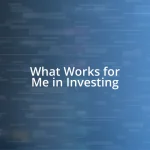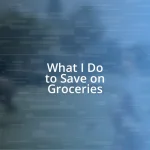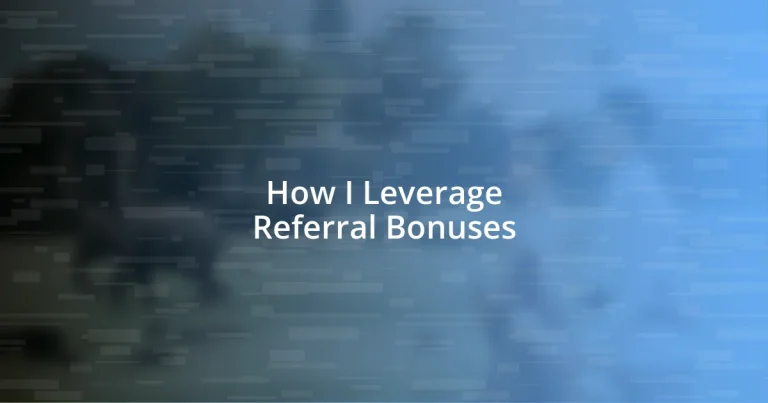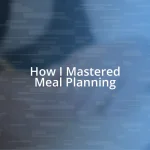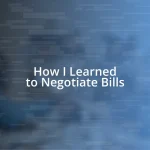Key takeaways:
- Referral bonuses are incentives that leverage personal recommendations, creating a cycle of goodwill for both parties involved.
- Building a referral network involves nurturing relationships, being proactive, and identifying opportunities through everyday interactions.
- Effective referral strategies include personalizing messages, creating a sense of urgency, and following up to maintain engagement and maximize earnings.
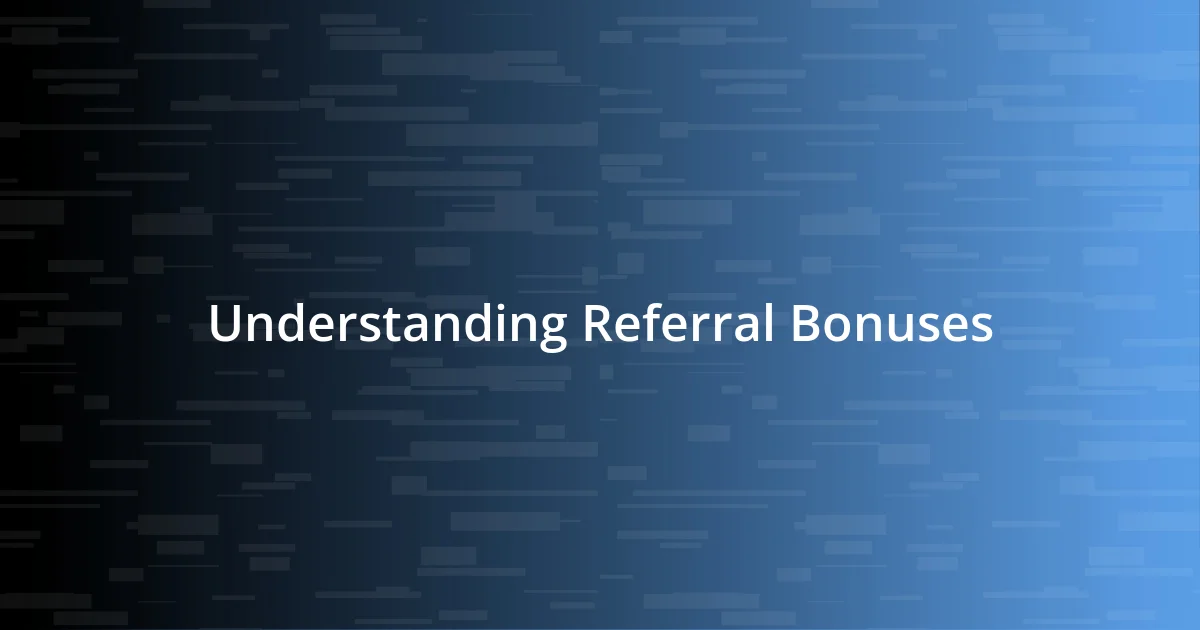
Understanding Referral Bonuses
Referral bonuses are essentially incentives offered to encourage existing clients or employees to bring in new customers or colleagues. I remember when I first discovered a company’s referral program at a previous job; the prospect of earning an extra bonus just by sharing my positive experience felt like a win-win, both for me and for the company. Have you ever thought about how much trust we place in personal recommendations? It’s fascinating how word-of-mouth can significantly impact customer acquisition, and referral bonuses take this concept to the next level.
In many cases, companies provide monetary rewards or discounts for successful referrals, which can drive motivation. I personally experienced immense satisfaction when a friend signed up using my referral link, and I received a bonus. There’s something rewarding about not just helping someone discover a valuable service but also reaping tangible benefits from it. It creates a cycle of goodwill—don’t you love when good deeds have a little extra payoff?
Moreover, understanding how referral bonuses work can empower you to maximize your earnings. I’ve learned to keep a lookout for referral programs across various platforms, turning everyday interactions into potential income opportunities. The more I engage with these programs, the more I see referrals as not just an obligation but a fun challenge—who wouldn’t enjoy sharing something they genuinely like while also snagging a bonus?
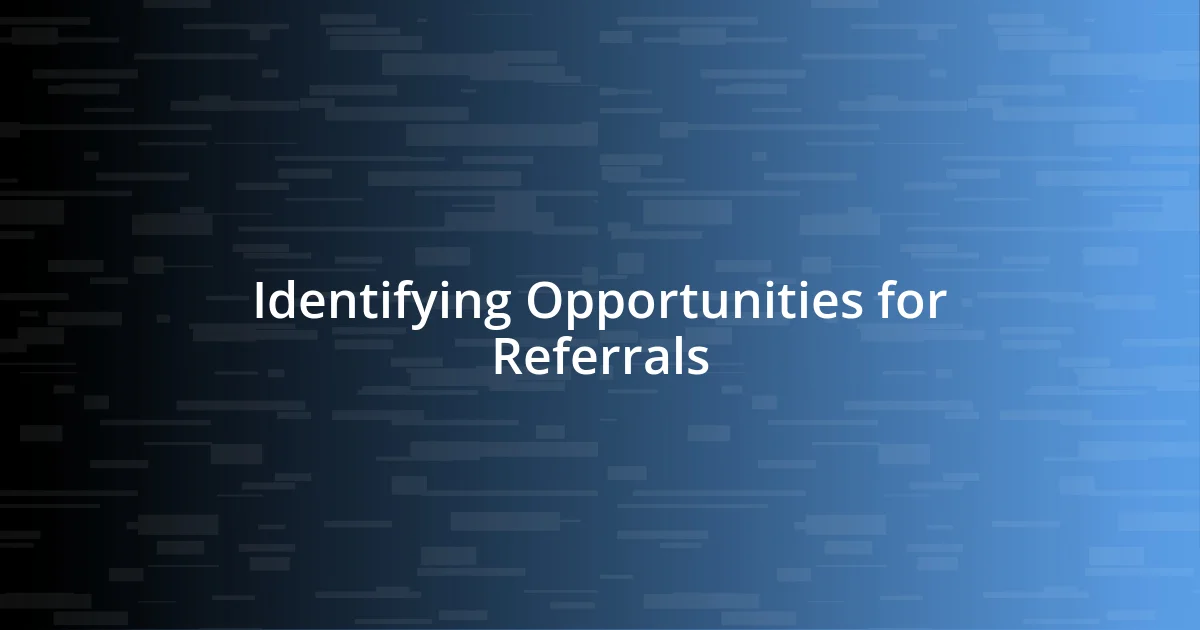
Identifying Opportunities for Referrals
Identifying opportunities for referrals often requires a keen eye and a proactive approach. In my experience, every interaction is a potential referral moment—whether it’s while chatting with friends, colleagues, or even at social gatherings. I always feel a small thrill when I think about mentioning a service I love; it’s like showing someone a hidden gem. You never know who might be looking for exactly what you’re sharing.
Here are a few specific places I’ve found great referral opportunities:
– Networking Events: These are prime for connecting with like-minded individuals who could benefit from the services I recommend.
– Social Media: I often post about products and services I enjoy, and it’s amazing how interested my followers can be.
– Workplace Conversations: Casual discussions around the water cooler can easily pivot to referrals, especially if a peer expresses a need.
– Community Groups: Local meetups or online forums are great for identifying needs within a community, opening doors for sharing valuable referrals.
– Friends’ Recommendations: When friends ask for advice, I seize the chance to refer services I’ve enjoyed.
By keeping my antennae up during everyday interactions, I’ve turned many seemingly ordinary conversations into opportunities for referrals and rewards. It’s fulfilling to know I’m helping others while also potentially earning a little extra.
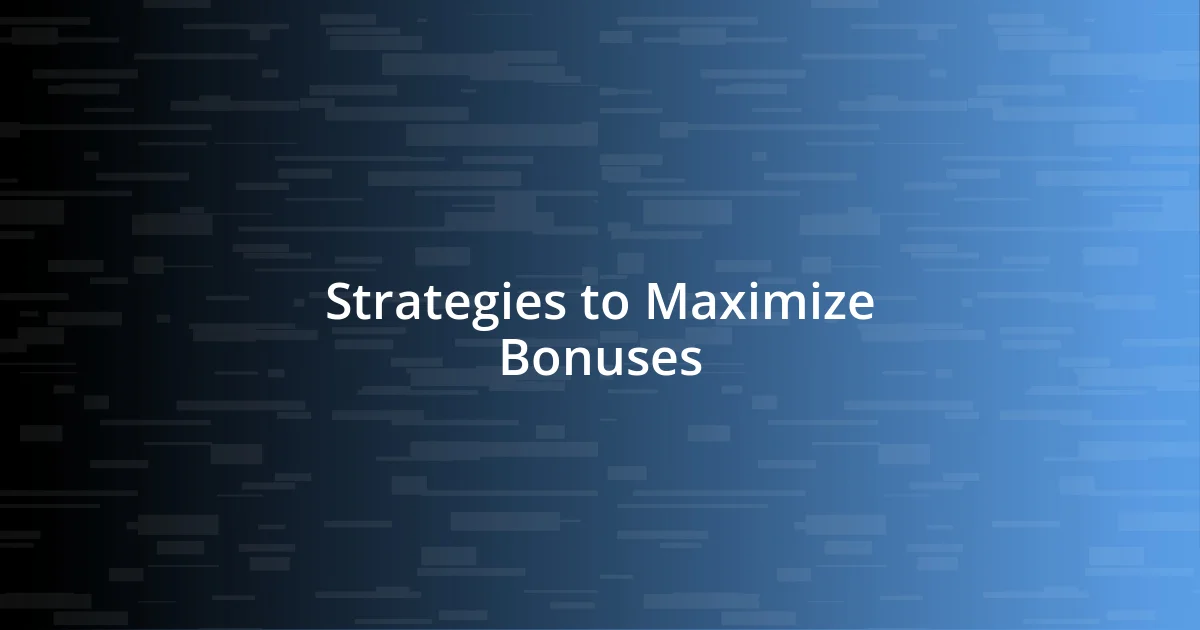
Strategies to Maximize Bonuses
Maximizing referral bonuses is all about clever strategies and timing. I’ve found that one of the best ways to enhance my referral rewards is to create a personal connection with the person I’m referring. When I share my enthusiasm for a product, my excitement tends to rub off. Last month, a friend approached me about a service I had used for years. Instead of just sending them my referral link, I took the time to share my experience—the benefits I enjoyed and how it had simplified my life. It turns out, they signed up immediately after our chat, which felt amazing on both ends!
I also believe in leveraging social platforms. Occasionally, I host virtual gatherings where I discuss the tools and services that have made a difference in my life. During one of these sessions, I shared my referral codes, and without even realizing it, several attendees ended up signing up. It was such a rewarding moment! Since then, I make it a point to integrate sharing my referral bonuses into my conversations and activities. It’s a fun way to engage with others and indulge in some lighthearted competition to see who can get the best referrals.
Another effective tactic is staying updated on ongoing promotions. Companies often run campaigns with enhanced referral bonuses. I once noticed that a favorite app of mine offered double rewards for referrals during the holiday season. I took a few minutes to share this exciting news with my network, resulting in a substantial boost in my bonuses. Spotting these opportunities not only maximizes my earnings but also allows me to help others discover great services that could truly benefit them.
| Strategy | Description |
|---|---|
| Personal Connection | Share genuine experiences to instill trust and excitement in potential referrals. |
| Utilize Social Media | Engage with your network by discussing and promoting services during interactions or events. |
| Stay Informed on Promotions | Keep an eye on referral bonus campaigns and leverage them to maximize earnings. |
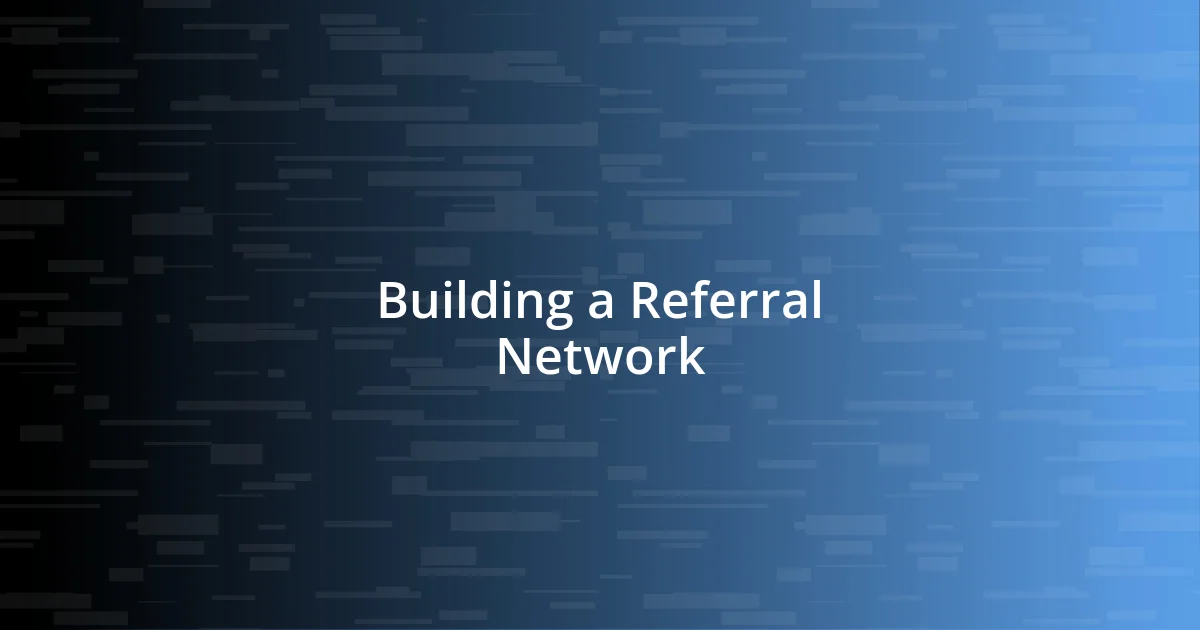
Building a Referral Network
Building a referral network is all about nurturing relationships and creating trust. I remember a time when I joined a book club; it wasn’t just about reading—sharing recommendations became a communal activity. By genuinely connecting with members, I discovered their preferences, which allowed me to offer tailored referrals. It’s incredible how a simple conversation can lead to mutual benefits, don’t you think?
I find that the key lies in staying active within your network. For instance, I regularly check in with past contacts—just a casual text to see how they’re doing or to share something interesting. This approach fosters goodwill and makes them more receptive when I mention referral opportunities. It’s like watering a plant; the more you nurture it, the more it flourishes.
Lastly, attending local events is a game changer for building that network. I once met someone at a charity event who was looking for a service I had previously used. By just being myself and sharing my positive experience, I was able to connect them with a solution they were desperate for. Imagine how rewarding it felt to be able to help them! It solidified a bond and opened the door for future referrals.
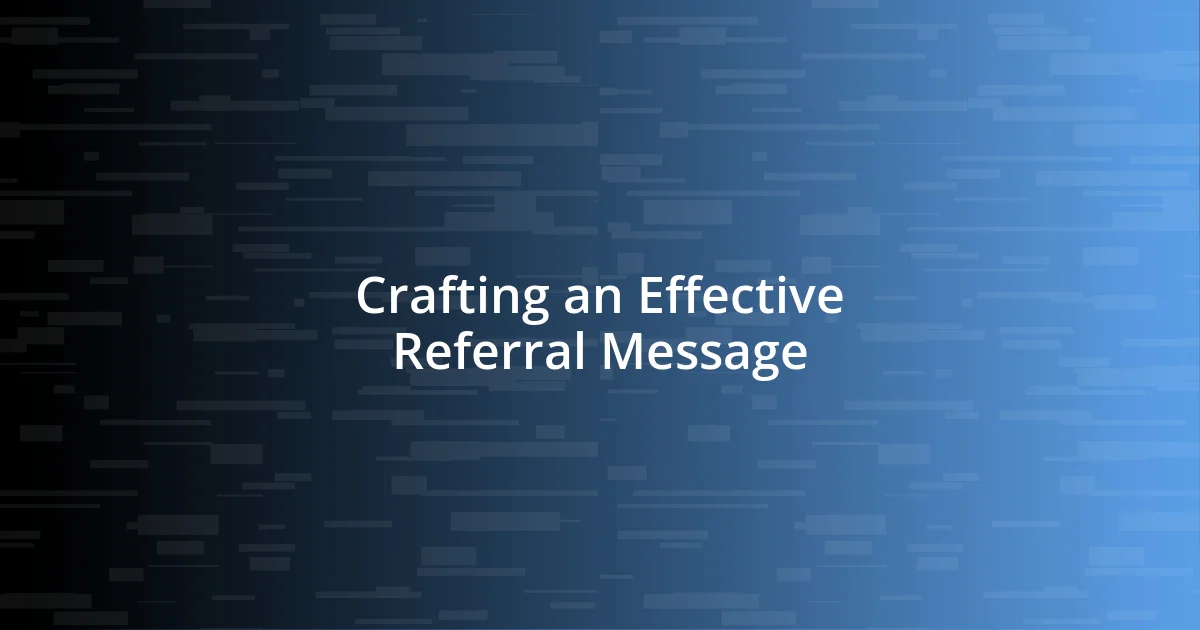
Crafting an Effective Referral Message
Crafting an effective referral message starts with understanding your audience. I remember when I needed to refer a colleague to a project management tool I loved. Instead of just sending over a generic link, I took a moment to craft a message that spoke directly to their struggles with organization. It felt personal, almost like I was tailoring my advice for a friend, and to my delight, they signed up immediately. Doesn’t that feel rewarding?
Another approach I like is to include a sense of urgency in my messages. When I shared my referral link to a pet service during a limited time promotion, I highlighted how it wasn’t just about getting a bonus for myself, but how my friend could also benefit from the offer while it lasted. This tactic often encourages quicker action. It’s fascinating how a little psychological nudge can turn a casual interest into immediate engagement, isn’t it?
Lastly, I find it valuable to wrap up my messages with genuine enthusiasm. A while ago, I referred a family member to a fitness app after sharing my own successful journey with it. I recounted the personal milestones I achieved through their program and ended the message with an invitation to join me in a workout challenge. Not only did they sign up, but we transformed our fitness routine into a fun bonding experience. Isn’t it amazing how sharing your passion can lead to rewarding connections?
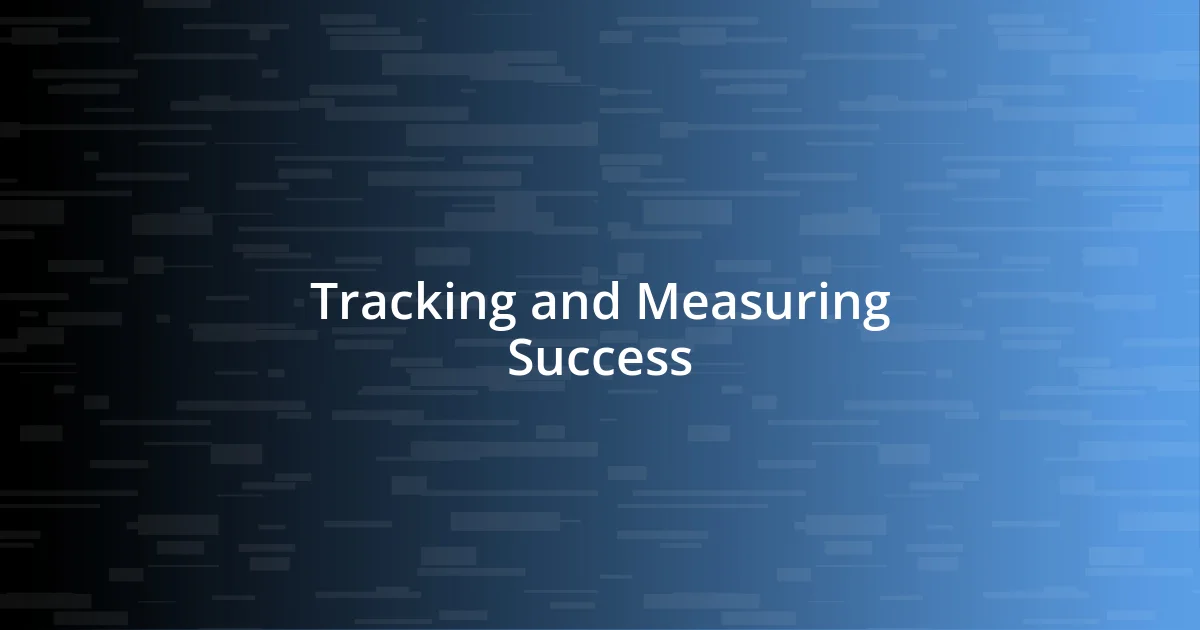
Tracking and Measuring Success
Tracking the success of referral bonuses is crucial, and I’ve discovered that keeping a simple spreadsheet can work wonders. When I started using one to log referrals, I felt a newfound clarity. By recording not only the names of those I referred but also the status of each lead, I could identify patterns in what strategies yielded the best results. It’s like having a roadmap guiding me toward consistent success.
I also like to analyze which referral sources generate the most interest. A while back, I noticed that my posts on social media brought in more engaged referrals than email campaigns. This revelation prompted me to focus on creating tailored content that resonates with my audience. Have you ever experienced that moment when data leads to an unexpected breakthrough? For me, it was exhilarating.
Lastly, I find that setting specific goals helps me stay motivated. For example, I aimed for a certain number of successful referrals each month, which pushed me to refine my approach continuously. Celebrating those small wins—like receiving feedback from a friend who appreciated a service I recommended—fills me with satisfaction. Tracking progress isn’t just about numbers; it’s about fostering meaningful connections that resonate well beyond the bonus. How do you measure your achievements in building a network?
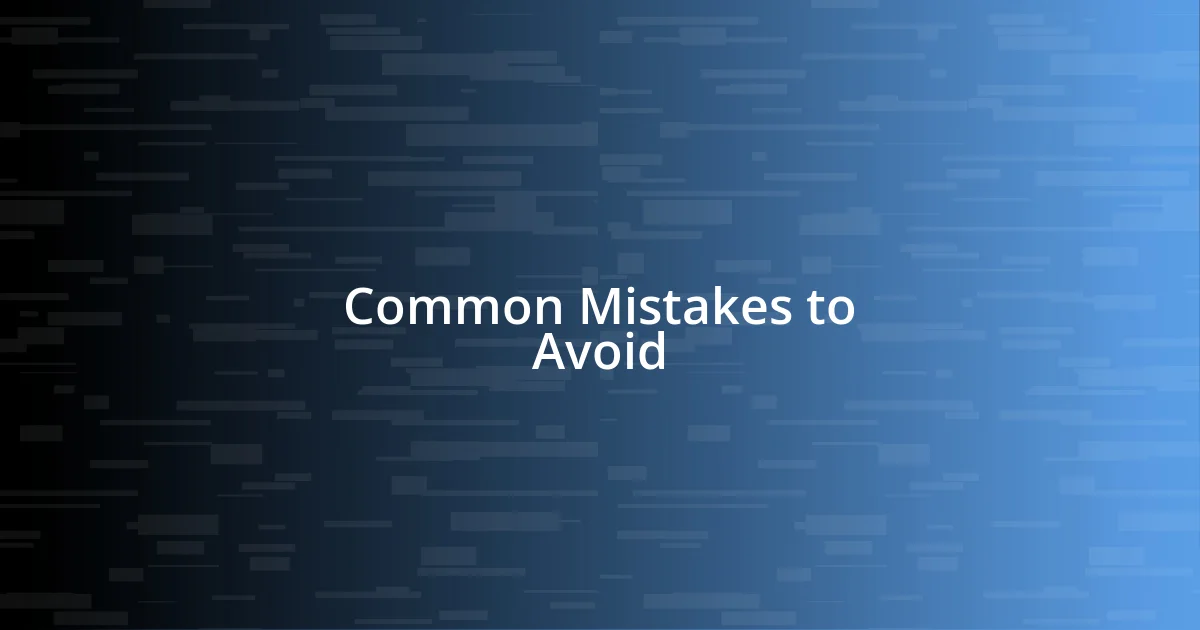
Common Mistakes to Avoid
One common mistake I’ve seen is neglecting to follow up with my referrals. I remember a time when I referred a friend to a fantastic software tool but forgot to check in afterward. A few weeks later, I realized they never signed up. It hit me that a simple follow-up could have sparked their interest and helped them see the value firsthand. Have you ever missed a chance just because you didn’t reach out again?
Another pitfall is overpromising on rewards. Early on, I made the mistake of advertising a referral bonus without fully understanding the terms. My friend got excited about the offer, but when the bonus didn’t come through as I expected, it led to some frustration. I learned to clarify the details and manage expectations from then on. It’s essential to convey accurate information to maintain trust—how can we expect others to act if we set them up for disappointment?
Lastly, I’ve found that a lack of personalization in my messages can fall flat. There was a time when I sent a generic referral link out to a group, thinking mass outreach would bring in results. Instead, I saw minimal engagement. Reflecting on that, I realized that adding personal touches makes all the difference. When we share why we love a product or how it solved a problem for us, it creates a connection. When you think about your communications, do you see the benefit of tailoring your approach?



